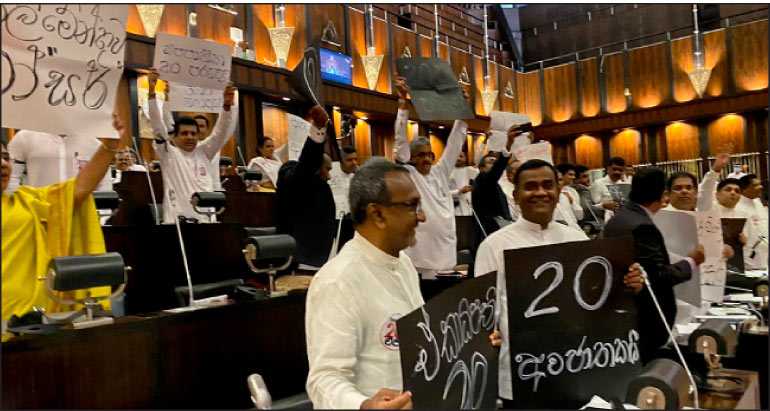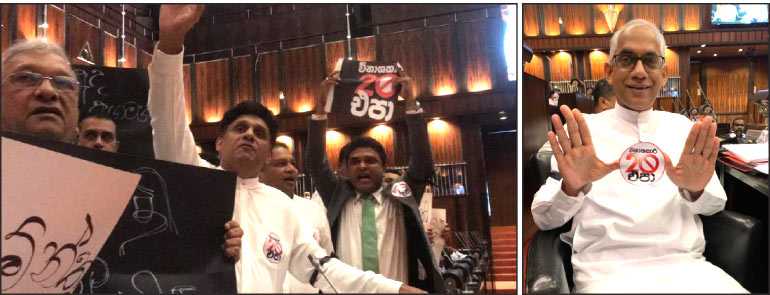Wednesday Feb 18, 2026
Wednesday Feb 18, 2026
Wednesday, 23 September 2020 03:27 - - {{hitsCtrl.values.hits}}


By Chandani Kirinde
Justice Minister Ali Sabry presented the 20th Amendment to Parliament yesterday amidst strong protests by Opposition MPs.
The Bill was presented to the House by Minister Sabry, whose voice was drowned by the din of shouts from MPs of the Samagi Jana Balawegaya (SJB) whose voice rose in a chorus to the words “apita vissa epa” (“we don’t want 20”) and carried placards, wore black armbands and ‘No to 20’ badges as Opposition Leader Sajith Premadasa described it as a “dark day for democracy”.
Later the Opposition MPs walked to the Well of the House carrying placards and shouting against the 20th Amendment which prompted Government MPs to also walk to the centre shouting “apita vissa oney” (“we want 20”). The presence of both Opposition and Government MPs in the Well of the House led to a standoff which lasted for over half an hour.
As the protests continued, Sergeant-at-Arms Narendra Fernando and his Deputy Kushan Jayaratne were standing beside the Mace.
Speaker Mahinda Yapa Abeywardena made a valiant effort to get the Opposition MPs to return to their seats, but did not have much luck. Amidst the chaos, Leader of the House Minister of Trade Bandula Gunawardena moved 43 resolutions and Orders related to levies and taxes and started the debate which was scheduled for the day.
However, most MPs strayed from the subject under discussion and 20A was discussed by most MPs with Samurdhi, Household Economy, Micro Finance, Self-Employment, Business Development and Underutilised State Resources Development State Minister Shehan Semasinghe requesting the Opposition to petition the Supreme Court against the Bill if it so wished and as provided for by the Constitution without protesting in Parliament.
“During the previous Government, we witnessed how no confidence motions were passed in the House. They did so after suspending the Standing Orders of the House. We do not act in such an undemocratic manner. People have given us a mandate to do away with the 19th Amendment. We act according to that mandate given to us by the people and we don’t need the permission of the Opposition for that,” he said.
Opposition Leader Sajith Premadasa said it was a “dark day for democracy” where a Bill that diminished the powers of the Legislature had been introduced to the House. “We register our opposition to the 20th Amendment. This amendment has provisions that will erode democracy in the country and only strengthen the Executive,” he said.
Minister Mahananda Aluthgamage said there were at least 17 Opposition MPs who are in talks to join the Government and support 20A. “We will get 20 MPs from the Opposition who will vote for this Bill and we will get 170 votes in support of the Bill,” he said.
The 20th Amendment will replace the 19th Amendment to the Constitution which was enacted in May 2015 and will restore the powers of the Executive which were scaled down by 19 A, replace the Constitutional Council with a weakened Parliamentary Council (PC), allow dual citizens to sit in Parliament and lift restrictions on the number of Cabinet and junior ministers.
The President’s powers to dissolve Parliament after one year of its election which was increased to four-and-a-half years under 19A will be restored while members to the Election Commission, the Human Rights Commission and five others will be made by the Executive.
The introduction of urgent Bills to Parliament which was done away with by 19A will also be brought back. In such a case, a Bill which in the view of the Cabinet of Ministers is urgent in the national interest can be referred directly to the Supreme Court by the President seeking a ruling on its constitutionality, with the Court required to give a ruling within 24 hours to three days. The Bill can then be tabled in Parliament, debated and passed the same day.
The Constitution provides for interested parties to invoke the jurisdiction of the Supreme Court to determine whether any Bill or any of its provisions are inconsistent with the Constitution within seven days of its presentation to Parliament.
If the Bill is not challenged in the Supreme Court, it can be taken up for debate after seven days. If challenged, the Supreme Court has to deliver its determination within 21 days from the date of the petitions. Parliament is not entitled to take any action on this Amendment Bill during that period.